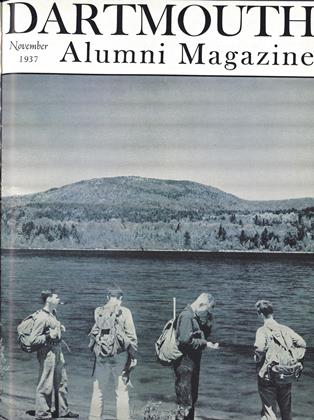by Herman Feldman. The Macmillan Company, New York, 1937; 353 pp. $2.50.
If the main business of a professor is to induce people to think, Professor Feldman of the Tuck School sticks to the main business in the present volume. As a means of inducing people to think about labor "relations" (the sub-title of the book informs us that the main things "related" are Labor, Capital, and Government), he presents some three hundred cases for the study of wages, hours and working conditions, insecurity, personnel problems, collective bargaining, and labor law.
The author's experience as a teacher and writer has led his readers to expect a good deal of him; but it seems safe to say that not many of them will be disappointed this time. The cases, most of them based on real situations, are interesting at the same time that they are brain-twisters. They are presented so clearly that even a Congressman could understand what the problems are. But they are not easy. It is intended that they should not be. Their propounder hopes, and probably not in vain, that they will arrest both "the vaguely sociological person" and the person who is inclined to dismiss a problem by the summary application of "the traditional or authoritative ideas concerning it." For example: here is a manufacturer who wants to maintain decent wages, but he is subjected to strain by two competitors who not only slash wages but also enjoy subsidies from the towns where they operate. What do you do in a case like that? The author does not forbid you to apply principles. He has only arranged to make you look foolish if your principles do not really apply. The cases, although realistic, are sufficiently general in character, to prove useful to the solution of future labor problems. The book is a workmanlike job which should help greatly to obviate both hot air and sepulchral silence from classes dealing with labor relations. Now it is only necessary to find teachers industrious enough to use it.
So much for an excellent piece of work. Just the same, there is one more problemcall it "Case 301" if you like—to be taken up with the author. A problems book without answers is unfair to organized reviewers. Normally, an author uses a book to rearrange his prejudices, and this entitles the reviewer to the same cherished privilege. By declining to disclose his prejudices, does Professor Feldman think to frisk over a fast one, leaving the reviewer with his bat on his shoulder? Like the author, I'm not answering: I'm just asking. The question is far more serious than it may sound. Remembering the Italian and German professors who made the mistake of saying what they thought, there is much to be said for a problems book, if it will really enable teachers to preserve a nice balance on top of the fence. But will it? When you discuss labor relations, you are dealing with "social control." And social control does not exist in thin air, and neither does everybody control everybody. Somebody controls somebody. Who is to control whom? To break down and confess, don't actual courses in labor relations mostly train business men to control laborers? At any rate, won't you be driven off the fence, one way or the other, by the smell of "qualities of leadership," that fragrant gas which gives editors of alumni magazines such prodigious mileage?
 View Full Issue
View Full Issue
More From This Issue
-
 Article
ArticleThe Making of Civilized Men
November 1937 By ALEXIS CARREL -
 Article
ArticleGradus Ad Parnassum
November 1937 By THE EDITOR. -
 Class Notes
Class NotesClass of 1914
November 1937 By Edwrd Leech -
 Article
ArticleHanover's Most Illustrious Woman
November 1937 By GABRIEL FARRELL '11 -
 Class Notes
Class NotesClass of 1932
November 1937 By Edward B. Marls Jr -
 Class Notes
Class NotesClass of 1928
November 1937 By Osmun Skinner
Bruce Knight
Books
-
 Books
BooksALUMNI PUBLICATIONS
April 1917 -
 Books
BooksFACULTY PUBLICATIONS
April 1917 -
 Books
BooksTHE GEOGRAPHY OF POVERTY IN THE UNITED STATES.
NOVEMBER 1972 By ALBERT S. CARLSON -
 Books
BooksGENERAL ALARM: A DRAMATIC ACCOUNT OF FIRES AND FIRE-FIGHTING IN AMERICA.
NOVEMBER 1967 By JOHN A. RAND '38 -
 Books
BooksMILITARISM, U.S.A.
OCTOBER 1970 By Louis Morton -
 Books
BooksTHE MAMA TASS MANIFESTO.
OCTOBER 1970 By Robert O. White ’54







